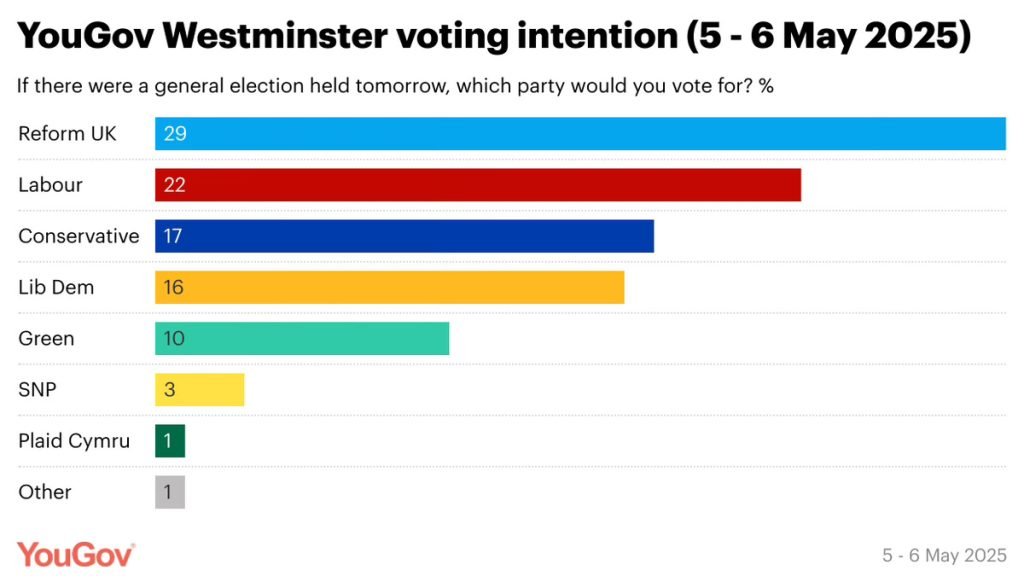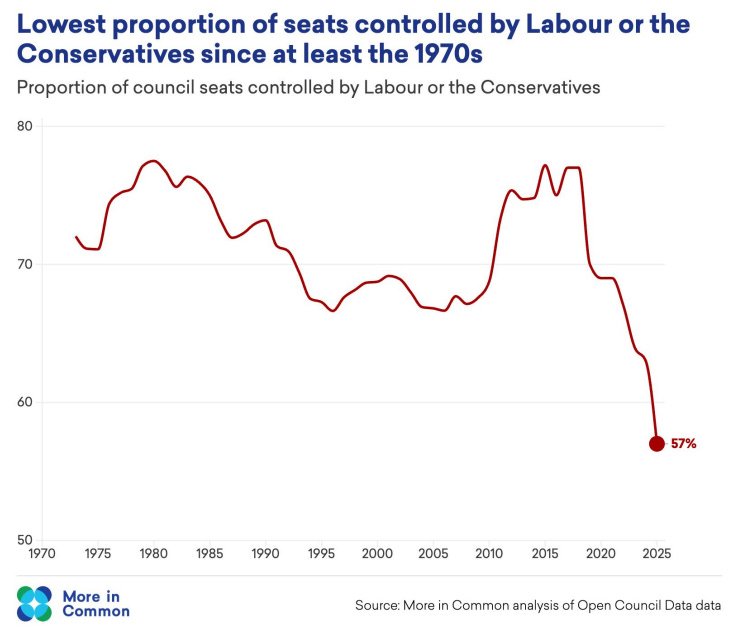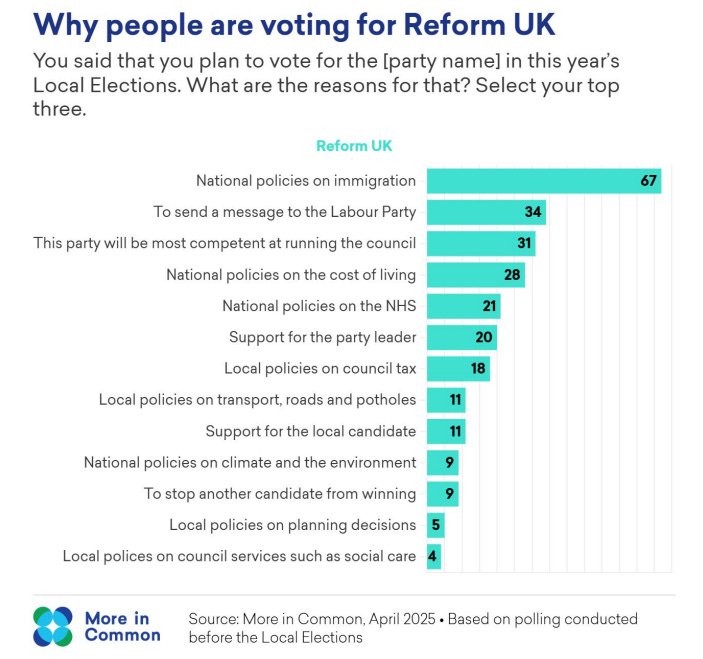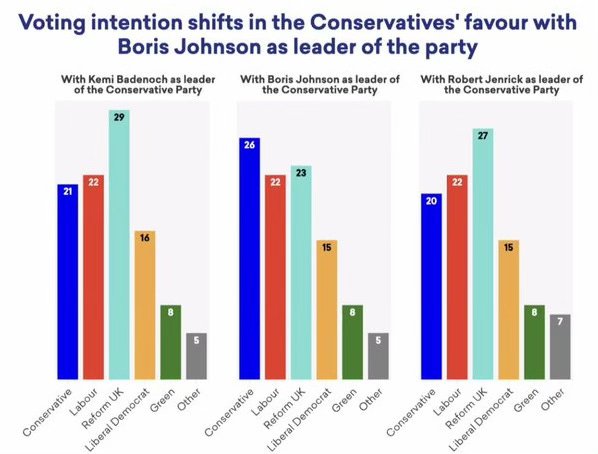IN THE aftermath of England’s historic local election results, we’ve had a round of national polling which confirms what I’ve long argued https://www.mattgoodwin.org/ – the entire British political system is changing shape in profound and perhaps permanent ways.
We are, in short, witnessing a full-blown political revolution against the establishment. Here’s what you need to know about the most important trends right now, along with the very latest numbers, charts, maps, and more . . .
Consistent with what I noted at the time of the local elections, Nigel Farage and Reform are now surging in the national polls.
In the latest poll by YouGov, one of the most reliable pollsters, Reform is on 29 per cent, Labour is on 22 per cent, the Tories are languishing on 17 per cent, their lowest share of the vote since the party’s dark days of 2019, while the Liberal Democrats are on 16 per cent.

This not only puts Reform firmly in the lead and well outside the margin of error, but also points to a commanding Reform majority at the next general election.
Were these numbers replicated at a general election they would give Nigel Farage and Reform close to 350 seats and a majority of 40, Labour would lose close to 270 seats and be reduced to just 143, while the Tories would crash and burn, reduced to a couple of dozen or so seats. It would be like nothing we have ever seen before.

It would represent the transformation of the two-party system that has governed this country for the last hundred years, with Reform emerging as the second major party in an increasingly volatile and fragmented two-party system.
If you want a sense of just how volatile things have become, look at some of the other numbers in the polls.
Astonishingly, the two big parties, Labour and Conservative, combined can count on support from only 39 per cent of all voters, which is down 20 points on their combined vote at the general election only ten months ago.
This not only reflects the sheer speed of change in British politics but a widespread public repudiation of the entire political class in Westminster.
Neither Sir Keir Starmer and Labour, nor Kemi Badenoch and the Tories, are captivating the country. More than half of all voters are supporting somebody else.
This isn’t the only sign that the British people are giving up on the Uniparty. In the local elections, the share of council seats controlled by either Labour or the Tories tumbled to the lowest share of the vote since the 1970s, underlining how the two big parties are losing touch with the country.

Why is Reform surging? Look into the detail and it soon becomes clear.
Nigel Farage and his party are basically hoovering up a much larger share of the Tory electorate while making big gains among Brexit voters, the working class, and women.
Compared with the start of this year, the share of 2024 Tory voters, people who voted Conservative last year, who plan to vote Reform has nearly doubled, to 30 per cent.
In other words Nigel Farage is now poaching nearly one in three people who voted Conservative last July, having already poached last year a lot of people who voted for Boris Johnson and the Tories in 2019.
The share of Brexit voters who plan to vote Reform has surged nearly 10 points to 54 per cent, meaning more than half of the Brexit vote has fallen in line behind Reform.
The share of women who are backing Reform is also up nearly 10 points to reach 28 per cent, while the share of working-class voters who plan to vote Reform is up nearly 10 points to 39 per cent. Reform is easily the most popular party among the working class.
And the number one reason for voting Reform?
Consistent with what we have already shown on this Substack, the top reason for voting Reform last week was immigration.
National policies on immigration, namely people’s opposition to these policies, was the top reason for casting a vote for Reform, followed by a desire ‘to send a message to the Labour Party’ – again, reflecting many of the points I’ve made.

With Reform rapidly cementing its position as the main alternative to the Labour Party, is there anybody who can stop the looming death of the Tories?
The pollsters More In Common have some interesting figures on this, comparing how the fortunes of the Tory party vary whether it is led by Kemi Badenoch, Boris Johnson or Robert Jenrick.
The short answer appears to be that only Johnson would have a chance to fending off the Reform challenge, with a Boris-led Tory party 3 points ahead of Reform in this hypothetical match-up.

But you know what?
I’m honestly not convinced about this at all.
What this polling does not take account of is what Nigel Farage and Reform would point out in reply to a Boris Johnson-led Tory party.
That it was Boris Johnson who began the current chaos we see around us today by pushing down the pedal on mass uncontrolled immigration.
That it was Boris Johnson who set the stage for the rise of Reform in the first place by losing control of our borders and failing to stop a rising tide of illegal migration.
That it was Boris Johnson who, long before Labour’s dodgy free trade deal with India, set the stage for this globalist politics by even removing the requirement for British companies to advertise jobs in Britain before advertising them elsewhere.
And that it was Boris Johnson who promised the world to all those ex-Labour Red Wallers, the working-class, and Brexit voters before promptly betraying them and selling them, their communities and the country down the river.
So, no, I do not think Boris Johnson would be capable of stopping the political revolution that is now unfolding around us – a revolution against the establishment that is getting stronger and broader as each week replaces the last.
Because what the polling is now telling us is pretty clear, even if many people in SW1 and Westminster refuse to accept it.
Nigel Farage and Reform are now seriously emerging as the main opposition to Sir Keir Starmer and the Labour government, while the political system is undergoing the most significant change since the rise of Labour in the early twentieth century.
A political revolution is now under way, and much like the rise of that embryonic Labour movement it looks likely to transform our politics and country.
This article appeared on Matt Goodwin on May 8, 2025, and is republished by kind permission.











